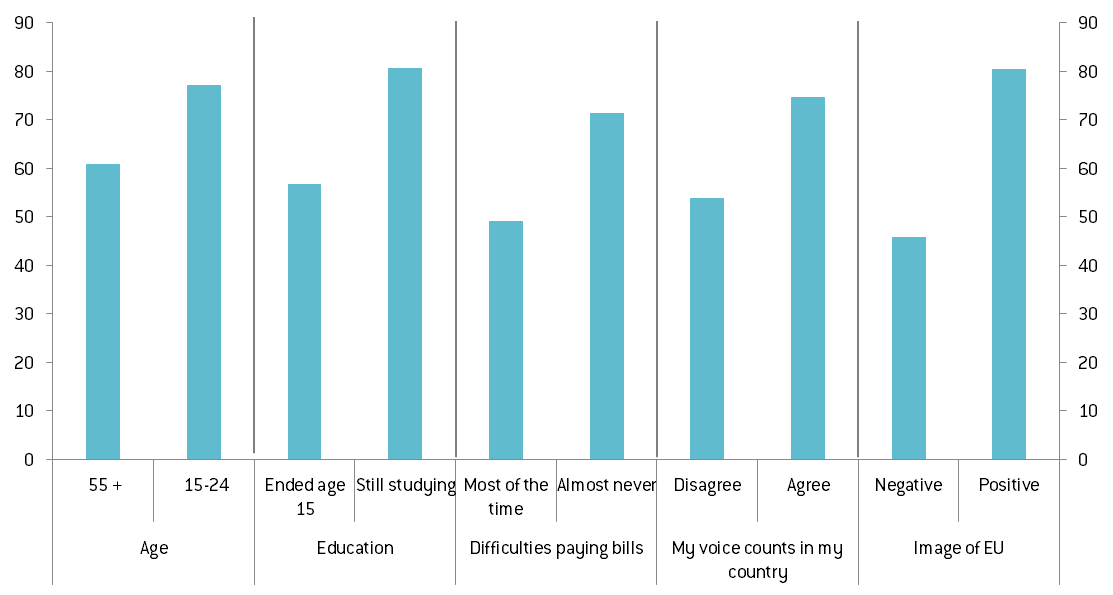Europeans rediscover enthusiasm for globalisation
The general political mood on both sides of the Atlantic seems to suggest declining public support for globalisation, but people in the EU increasingl
The backlash against globalisation is fuelled by various factors, including xenophobia, job losses, a fear of losing national cultural identity and even the fear of terrorism. Anti-globalisation advocates propose various economic and cultural protectionist measures, as one can see in the recent election campaigns in the US, the Netherlands and France. On the other hand, leaders of the IMF and World Bank have moved to defend globalisation, while pushing for inclusive policies that would ensure benefits for a wider part of the population, rather than a few. See for example Christine Lagarde’s recent speech.
So what are the attitudes of Europeans towards globalisation? Figure 1 shows the share of respondents who see globalisation as an opportunity for economic growth. It is worth highlighting both the differences across countries and the dynamics of responses over time.
Citizens of northern European countries show by far the largest agreement with the statement that globalisation is an opportunity for economic growth: about 80% of respondents agreed to that in 2016. About 65% of respondents agreed to this statement in three western European and 11 eastern European EU countries, while agreement is about 55% in southern Europe. We singled out France, because French public opinion about globalisation is so different from Germany and other nearby countries. In France, the view that globalisation is good for growth already had much less support in 2009, and support was still relatively low in 2016 too.
The dynamics over time are also note-worthy. In all regions of the EU there was a drop in support for globalisation after 2009, when the economic crisis began to hit the economy and the people. Support is now gradually rebounding in more recent years across all EU country groups, in parallel with an improved economic situation.
Southern European countries experienced the largest drop in respondents agreeing that globalisation is an opportunity for growth in 2009-2012, which was in line with the fall in their trust in democracy and the EU. Since these countries suffered the most from the economic crisis, we cannot exclude the hypothesis that economic troubles damaged public perceptions about the benefits of globalisation and the European project. However, after 2012 the level of agreements starts to rebound, even in France.
What are the socio-economic characteristics of globalisation supporters? Figure 2 shows a clear pattern. In terms of age and education, young people and those who are still studying tend to view globalisation as an opportunity for growth; people aged 55 and more, and those who did not continue education beyond 15 years of age, are much less in favour.
People’s perception of their economic situation also makes a large difference. For instance, 71% of those who almost never have difficulty paying bills agree that globalisation is an opportunity, compared to only 49% of those who have difficulty paying bills most of the time.
Perception of individual political influence, proxied by the statement “my voice counts in my country”, also matters for those viewing globalisation as opportunity. 75% percent of those who think their voice counts in their country also think that globalisation is an opportunity for economic growth, compared to 54% of those who believe that their voice does not count in their country.
Finally, those who view the EU in a positive light are almost twice as likely to agree that globalisation is an opportunity for economic growth.
Thus, it seems (unsurprisingly) that younger and better educated people view globalisation as an opportunity, as well as those in a better economic situation, those feeling political inclusion and those with a positive view of the EU.
Figure 2. EU: Globalisation as an opportunity for economic growth, by socio-economic characteristics, 2016

Source: Eurobarometer. Note: Education ended age 15 means that the person ended education at the age of 15 or earlier.
Question: Please tell me to what extent you agree or disagree with the following statement: “Globalisation is an opportunity for economic growth”. Share of those respondents who replied “Totally agree” and “Tend to agree” among those who answered this question, according to certain socio-economic characteristics.
While the two numbers are not fully comparable, we note that Front National gained 24.8% of the vote at the European Parliament elections in 2014, while the Party’s leader, Marine Le Pen came second with 21% of the votes in the first round of the 2017 French Presidential elections.
We noted based on Figure 1 that France stands out from neighbouring countries, consistently having much lower support for the idea of globalisation as an opportunity for economic growth. Interestingly, the French answers to this question move more or less in the opposite direction to the popularity of Marine Le Pen, who is frequently viewed as an anti-globalisation and anti-EU politician (Figure 3). Thereby, the decline in the popularity of Le Pen from 2013-16 is in line with an increase in the French support for the idea that globalisation is good for growth.
Most likely, common causes drive the perceptions about both globalisation and politics, such as immigration, security, cultural identity, and economic troubles. We do not aim to assess the relative importance of these and other possible factors. But it is certainly worth highlighting the coincidence between economic developments and the post-2009 fall and post-2012 increase in the support for the idea that globalisation is good for economic growth (Figure 1). Meanwhile, a recent Bloomberg report shows an astonishing correlation between the share of votes for Marine Le Pen in the first round of the French presidential elections and the unemployment rate across the various regions of France.



